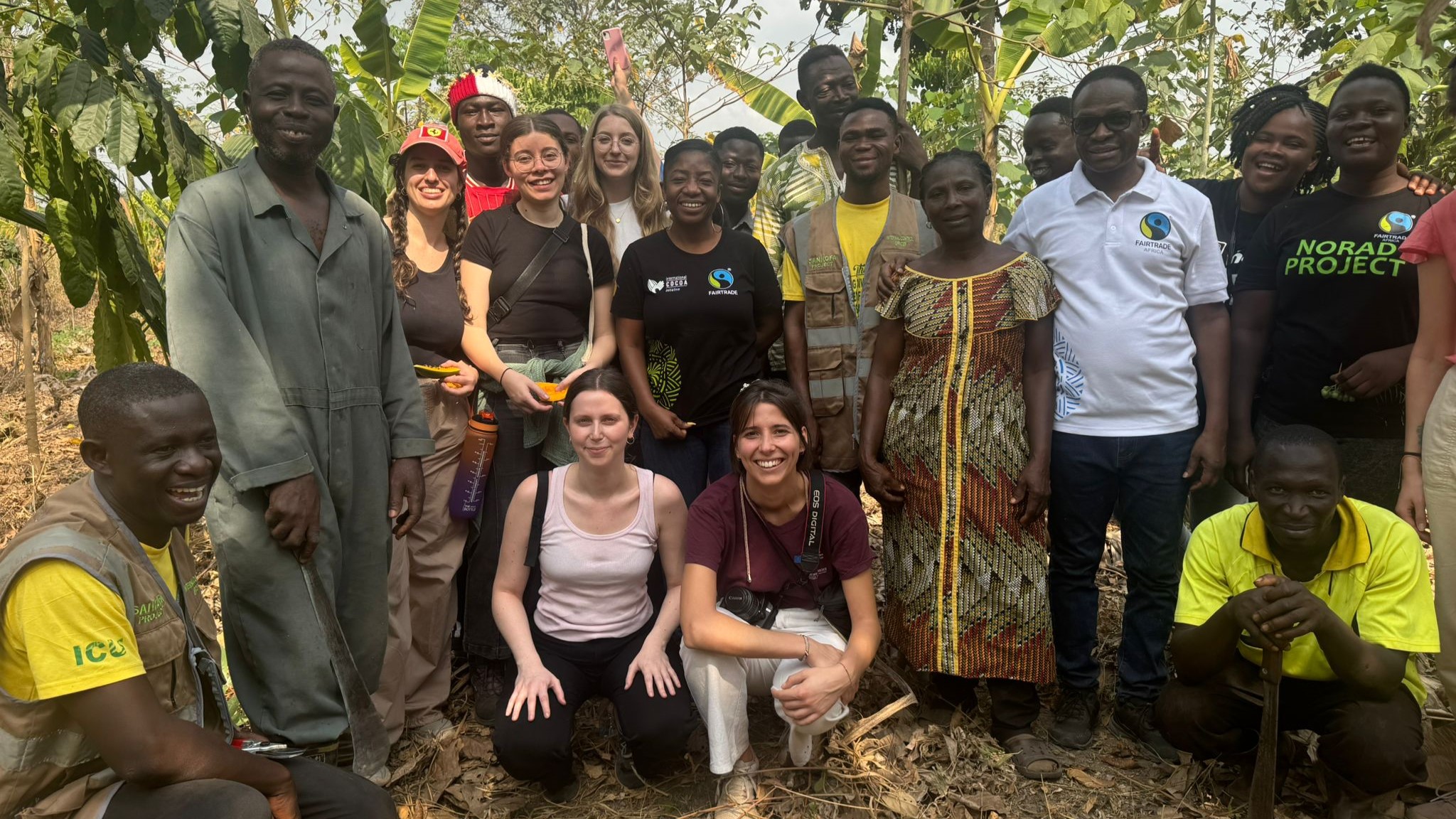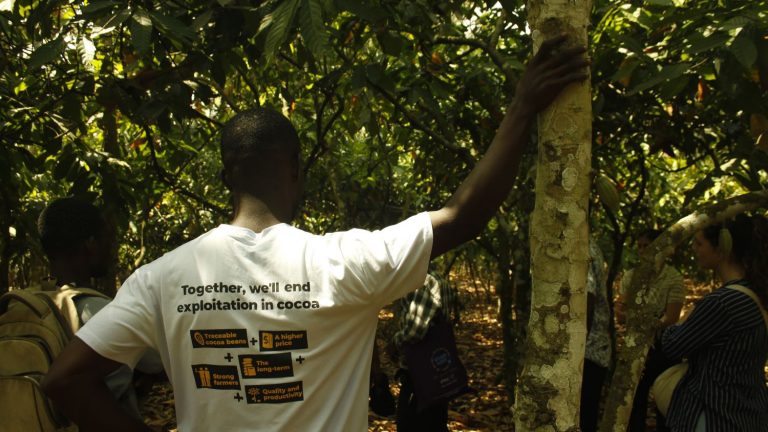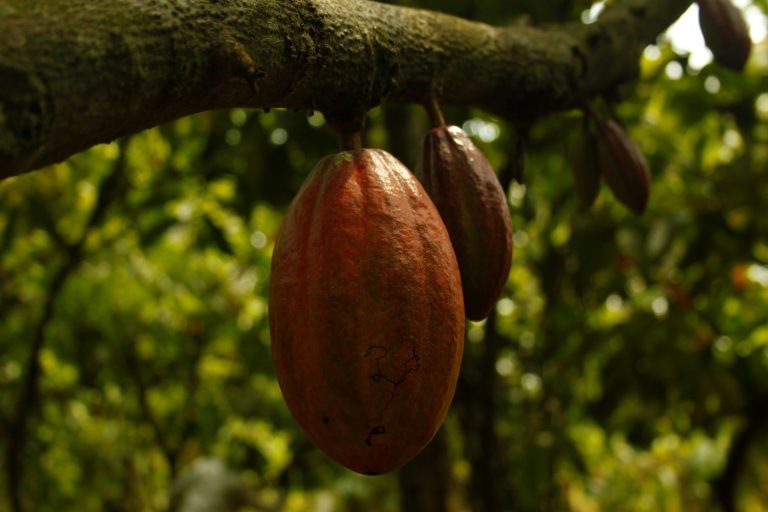Fairness, sustainability and the planet

Giorgia Dal Fabbro (DPhil International Development, 2024) reflects on her recent trip to visit Fair Trade farms in Ghana and advocates for a shift in trade practices to prioritise fairness, sustainability, and the well-being of both people and the planet.
As a student of international relations and sustainable development, I sat through many lectures on inequality, human rights, and climate change, often wondering about the profound seriousness of these challenges and what my personal role could be. I have often felt overwhelmed by the thought of how interconnected all of these challenges are, wanting to be able to address them all, but having to come to terms with the reality that life would only give me the time to pick one cause to fight for.
When a few years ago I stepped into the Fairtrade shop of my hometown, however, I was struck to find out that an initiative that tries to offer concrete solutions to these joint challenges already exists, and has been working towards social and environmental justice for decades. I kept asking myself ‘Why isn’t everybody talking about this?’ and ‘If only a small niche of the market can claim to be fair and respect people and the planet, what kind of market is the rest of it, the one we go by everyday?’ These questions have guided my participation in the Fairtrade movement ever since, ultimately bringing me to recently spend 10 days in Ghana visiting Fairtrade cocoa producers on the field thanks to a project led by the Fairtrade Advocacy Office and Fairtrade Africa that served me as a scoping study for my doctoral research on Fairtrade and climate change.
 Ghana is the world’s second-largest supplier of cocoa beans, a commodity whose production faces important social and environmental challenges, like unfair producer remuneration, deforestation, and climate change. We are often exposed to Global North policymakers, marketing firms, and NGOs’ reporting of these issues, but where are the voices and perspectives of Global South’s producers in all this, so often portrayed as helpless and in need of Western education and salvation? This trip has been an invaluable opportunity to witness, listen, and learn from producers themselves their experience of the interlinked social and environmental challenges that cocoa production is facing, and what roles Fairtrade plays in addressing them.
Ghana is the world’s second-largest supplier of cocoa beans, a commodity whose production faces important social and environmental challenges, like unfair producer remuneration, deforestation, and climate change. We are often exposed to Global North policymakers, marketing firms, and NGOs’ reporting of these issues, but where are the voices and perspectives of Global South’s producers in all this, so often portrayed as helpless and in need of Western education and salvation? This trip has been an invaluable opportunity to witness, listen, and learn from producers themselves their experience of the interlinked social and environmental challenges that cocoa production is facing, and what roles Fairtrade plays in addressing them.
Extremely conscious of climate change and deforestation, producers highlighted how this is making it extremely difficult to grow cocoa trees, which need specific environmental conditions to be able to thrive and require 3 to 4 years for the first fruit to sprout. Seeds bought and planted often dry very quickly and die, undermining farmers’ efforts and their financial stability. In this context, Fairtrade is supporting a number of agroforestry initiatives, where cocoa trees are planted together with other timber, fruit and biomass trees, helping healthier soils and biodiversity preservation while also providing farmers with alternative sources of income deriving from the sales of fruits and timber grown together with cocoa beans. Farmers championed these techniques, revealing how they do not need to be educated on how to produce sustainably – something they have been doing for generations and know all about – but rather need to be able to sustain the costs of sustainable production.
 The problem is in fact that agroforestry and Fairtrade production is more costly for producers compared to conventional cocoa farming. Hence, in order to maintain it, farmers need to receive adequate remuneration to offset costs and make a living. Clearly, however, no actors in the production chain want to take up the onus of paying a higher price: nor buyers, nor consumers, constantly exposed to the business-as-usual market dynamics that favour prices’ famous rush-to-the-bottom. In Ghana, this is further complicated by the role of the Government, which regulates the whole cocoa market, making it more challenging for Fairtrade too to transform its premium in pocket cash for the farmers. Still, farmers would be happy – and ready – to sell all of their production as Fairtrade, yet they only manage to do so for roughly half (sometimes even less) of their cocoa beans, while the rest goes as conventional, the reason being a lack of demand for Fairtrade cocoa.
The problem is in fact that agroforestry and Fairtrade production is more costly for producers compared to conventional cocoa farming. Hence, in order to maintain it, farmers need to receive adequate remuneration to offset costs and make a living. Clearly, however, no actors in the production chain want to take up the onus of paying a higher price: nor buyers, nor consumers, constantly exposed to the business-as-usual market dynamics that favour prices’ famous rush-to-the-bottom. In Ghana, this is further complicated by the role of the Government, which regulates the whole cocoa market, making it more challenging for Fairtrade too to transform its premium in pocket cash for the farmers. Still, farmers would be happy – and ready – to sell all of their production as Fairtrade, yet they only manage to do so for roughly half (sometimes even less) of their cocoa beans, while the rest goes as conventional, the reason being a lack of demand for Fairtrade cocoa.
Farmers’ experiences have been wide-opening, in particular on two issues:
- Farmers do not need help, they don’t need to be taught, they don’t need policy restrictions that do not consider local impact and further exacerbate working and living conditions. They need support, and possibly fair remuneration.
- What is lacking to increase Fairtrade impact is not producers’ willingness to be part of the system, but rather buyers and consumers’ demand for Fairtrade products
‘Trade is what harmed the people and the planet, so if we reverse the terms of trade, we can make the people and the planet better again’ told one of the farmers. Reversing the terms of trade today means going fair.
Sustainability at Green Templeton
Green Templeton recognises that the actions and choices of our community have a huge impact on the college’s environmental footprint, and are committed to embedding sustainable thinking throughout its operations. Read more about our sustainability initiatives and commitments

